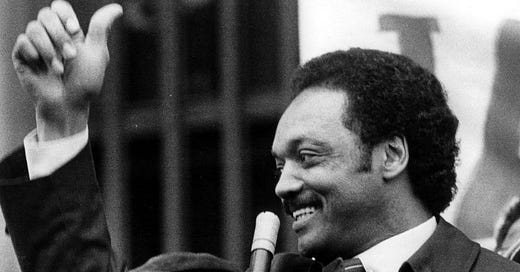What became of the vision of black power?
With the death, imprisonment, or exile of prominent African-American movement leaders, and with the emergence of black politicians who necessarily had to accommodate their political strategies to the Democratic Party establishment, what became of the vision of black power and its call for: black control of the black community in order to facilitate economic and social development; alliance with non-black popular sectors, including whites, in the forging of a national project for the protection of the economic and social rights of all, regardless of race; and an anti-imperialist foreign policy of cooperation with the neocolonized peoples of the earth? In reflecting on the African-American movement of the 1970s, attention must be given to Rev. Jesse Jackson, who emerged as the most prominent black leader of the period.
Jesse Louis Jackson was born in Greenville, South Carolina, on October 8, 1941. His step-father, Charles Henry Jackson, was a janitor in the post office. Hi…


